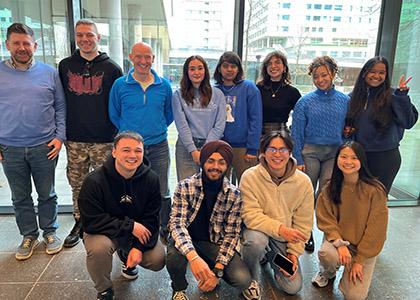*Please note the information contained herein is intended as a broad overview of the examination process. Full details of this process can be found in the Academic Regulations.
Candidates for a doctoral degree will be assessed on the basis of a written thesis and a viva voce examination. In the case of a practice-based award, a practice-based element may be required as part of the assessment. In the case of Master's candidates, the usual expectation is that there will be no viva voce examination. However, an examiner may recommend that a viva voce examination be held.
Each candidate for a higher degree by research will be examined by at least one Internal Examiner and at least one External Examiner. Examiners will be appointed by the DCU Graduate Research Studies board on the recommendation of the DkIT Research Programme Board.
Selection of Examiners:
Internal Examiners:
- The Internal Examiner should normally be a member of the DkIT Academic staff or a senior researcher who holds a PhD qualification.
- The Internal Examiner must be independent of the research, the student and the other examiner(s).
- The Internal Examiner must not be a member of the Candidates supervisory panel but should have experience in the supervisor of postgraduate students.
External Examiners:
- External Examiners should have:
- Recognised expertise in the area which is subject matter of the thesis under examination.
- Experience in the supervision and examination of postgraduate students
- Formal academic qualification which is recognised within the particular discipline as providing a suitable background for the role of external examiner
- Under no circumstances, should the Candidate be involved in the selection of the External Examiner
Full details relating to the eligibility of Internal and External Examiners can be found in the relevant section of the Academic Regulations Postgraduate Degrees by Research and Thesis.
Examination Process:
- The Graduate Studies office will supply the Examiners with softbound copies of the thesis for examination along with the relevant Examiners Report Forms and Examination Regulations.
- Examiners are usually expected to carry out their studies within two months of the receipt of the Thesis
- In the case of a thesis submitted for the award of a PhD, an Independent Chairperson will supervise a Viva Voce Examination
- In the case of a thesis submitted for the award of a Master’s Degree, a Viva Voce is not normally required but may be requested by the examiners
- Full assessment criteria for both PhD and Master’s degrees can be found in the Academic Regulations Postgraduate Degrees by Research and Thesis.
Viva Voce Examination:
- The Viva Voce Examination shall take place in DkIT, unless prior approval has been granted by the Graduate Research Studies Boards to hold it elsewhere.
- The Viva Voce Proceedings shall be managed by an Independent Chairperson. The Chairperson is expected to steer the examination process through to its conclusion.
- The examination is carried out jointly by the Internal and External Examiners. The Candidates Supervisory Panel may be present but are not permitted to participate in the examination, unless specifically requested to speak by the Examiners of the Independent Chairperson.
- Candidates can request that their supervisory panel be excluded from the Viva Voce by written request to the Independent Chairperson, not later than 10 days prior to the examination.
- Following the examination, the Examiners should complete the form relating to the examination of the thesis and;
- In the case of a PhD Candidate, and this should be submitted to the Graduate Studies office by the Intendant Chairperson.
- In the case of a Master’s candidate, where no Viva Voce is required, this form should be submitted by the Internal Examiner. In this instance, the Graduate Studies office will inform the Candidate of the outcome of the examination.
Outcome of Examination Process:
The final outcome of the examination process should be reported as one of the following recommendations:
- that the degree sought be awarded;
- that the degree sought be awarded subject to clearly specified textual emendations;
- that the degree sought be awarded subject to clearly specified revisions to content;
- that no degree be awarded, but that the candidate be allowed to submit a revised thesis, normally within a year;
- that, where a doctoral award is sought, a Master's degree be awarded instead
- that no degree be awarded as the candidate is unlikely to reach the standard for a research award; or
Appeals:
Should a Candidate wish to appeal the outcomes of an Examination, they should refer the Procedures and Grounds for Appeal outlined in Academic Regulations Postgraduate Degrees by Research and Thesis.












